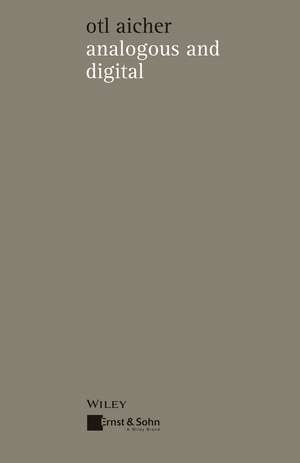Analogue and Digital 2e
Autor O Aicheren Limba Engleză Paperback – 10 mar 2015
"An integral component of Aicher′s work is that it is anchored in a "philosophy of making" inspired by such thinkers as Ockham, Kant or Wittgenstein, a philosophy concerned with the prerequisites and aims, the objects and claims, of design. Aicher′s complete theoretical and practical writings on design (which include all other aspects of visual creativity, such as architecture) are available with this new edition of the classic work.
If Aicher prefers the analogous and concrete to the digital and abstract he does it with a philosophical intention. He relativizes the role of pure reason. He criticizes the rationality of Modernism as a result of the dominance of purely abstract thinking. Anyone who prefers the abstract to the concrete does not only misunderstand the mutual dependence of concept and view. In Aicher′s judgement he is also creating a false hierarchy, a rank order that is culturally fatal. Things that are digital and abstract are not greater, higher and more important than things that are analogous and concrete."
Wilhelm Vossenkuhl
Preț: 144.29 lei
Nou
27.61€ • 29.52$ • 23.02£
Carte indisponibilă temporar
Specificații
ISBN-10: 3433031193
Pagini: 188
Ilustrații: 4 schwarz-weiße Abbildungen
Dimensiuni: 140 x 217 x 15 mm
Greutate: 0.25 kg
Ediția:2nd Edition
Editura: Wiley Vch
Locul publicării:Weinheim, Germany
Public țintă
Architects, Art Historians, Graphic Designers, Libraries at Universities, Civil Engineers, Test Engineers, Engineering Consultants, Universities of Applied Sciences, Technical Colleges, Engineering Students, Technical EditorsDescriere
Otl Aicher (1922 1991) was an outstanding personality in modern design, he was a co–founder of the legendary Hochschule für Gestaltung (HfG), the Ulm School of Design, Germany. His works since the fifties of the last century in the field of corporate design and his pictograms for the 1972 Summer Olympics in Munich are major achievements in the visual communication of our times.
An integral component of Aicher s work is that it is anchored in a philosophy of making inspired by such thinkers as Ockham, Kant or Wittgenstein, a philosophy concerned with the prerequisites and aims,
the objects and claims, of design. Aicher s complete theoretical and practical writings on design (which
include all other aspects of visual creativity, such as architecture) are available with this new edition of the classic work.
If Aicher prefers the analogous and concrete to the digital and abstract he does it with a philosophical
intention. He relativizes the role of pure reason. He criticizes the rationality of Modernism as a result of
the dominance of purely abstract thinking. Anyone who prefers the abstract to the concrete does not only misunderstand the mutual dependence of concept and view. In Aicher s judgement he is also creating a false hierarchy, a rank order that is culturally fatal. Things that are digital and abstract are not greater, higher and more important than things that are analogous and concrete.
Wilhelm Vossenkuhl
Textul de pe ultima copertă
Otl Aicher (1922 1991) was an outstanding personality in modern design, he was a co–founder of the legendary Hochschule für Gestaltung (HfG), the Ulm School of Design, Germany. His works since the fifties of the last century in the field of corporate design and his pictograms for the 1972 Summer Olympics in Munich are major achievements in the visual communication of our times.
An integral component of Aicher s work is that it is anchored in a philosophy of making inspired by such thinkers as Ockham, Kant or Wittgenstein, a philosophy concerned with the prerequisites and aims,
the objects and claims, of design. Aicher s complete theoretical and practical writings on design (which
include all other aspects of visual creativity, such as architecture) are available with this new edition of the classic work.
If Aicher prefers the analogous and concrete to the digital and abstract he does it with a philosophical
intention. He relativizes the role of pure reason. He criticizes the rationality of Modernism as a result of
the dominance of purely abstract thinking. Anyone who prefers the abstract to the concrete does not only misunderstand the mutual dependence of concept and view. In Aicher s judgement he is also creating a false hierarchy, a rank order that is culturally fatal. Things that are digital and abstract are not greater, higher and more important than things that are analogous and concrete
Cuprins
9 preface by sir norman foster
10 introduction
22 grasping with the hand and mind
28 extensions of the ego
36 the eye, visual thinking
47 analogous and digital
55 universals and capitals
60 buridan and peirce
63 reading scores
65 honourable burial for descartes
75 design and philosophy
93 architecture and epistemology
109 use as philosophy
133 planning and control
146 development, a concept
150 an apple
154 something quite ordinary
170 life form and ideology
178 cultures of thinking
188 afterword
190 sources
Notă biografică
Otl Aicher (1922–1991) was an outstanding personality in modern design, he was a co–founder of the legendary Hochschule fur Gestaltung (HfG), the Ulm School of Design, Germany. His works since the fifties of the last century in the field of corporate design, e.g. Lufthansa, and his pictograms for the 1972 Summer Olympics in Munich are major achievements in the visual communication of our times.
Prof. Dr. em. Wilhelm Vossenkuhl is a professor of Philosophy at Ludwig Maximilian University Munich.
